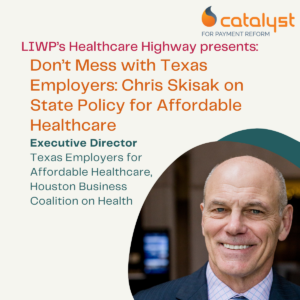This podcast is part of The Healthcare Highway, a limited series from CPR featuring conversations with public and commercial healthcare purchasers—and the advocates working alongside them—across the country.
In this episode of Listening In (With Permission), Andréa Caballero of Catalyst for Payment Reform sits down with Chris Skisak, Executive Director of Texas Employers for Affordable Healthcare and the Houston Business Coalition on Health, to explore how Texas employers are fighting back against hospital consolidation, opaque contracts, and rising healthcare costs.
With 3.5 million covered lives and a growing presence across Houston, Dallas-Fort Worth, and San Antonio, Skisak’s coalition is tackling one of the most entrenched problems in health care: a lack of transparency and competition. In this candid conversation, Chris sheds light on what’s really driving up prices in Texas—and what employers can do about it.
Key Insights:
-
Hospital consolidation’s hidden costs: Chris outlines how centralized hospital markets have stifled competition, raised prices, and weakened employer leverage.
-
A legislative win with teeth: Discover how Texas passed House Bill 711, banning anti-competitive clauses in contracts—like gag orders and steering restrictions—and why employers need to start using these new freedoms.
-
The price tag of inaction: Despite these wins, many employers still don’t know what’s possible. Chris reveals how consultants and health plans are keeping them in the dark—and what to do instead.
-
What’s next in Texas: Get the inside scoop on an ambitious 2025 policy agenda—from banning facility fees for telehealth to funding the state’s all-payer claims database (APCD) and creating real-time price estimate tools.
Whether you’re an employer, policymaker, or health benefits advisor, this episode offers a blueprint for pushing back against anti-competitive practices and reclaiming control of healthcare costs—starting with legislative advocacy and ending with real results.

